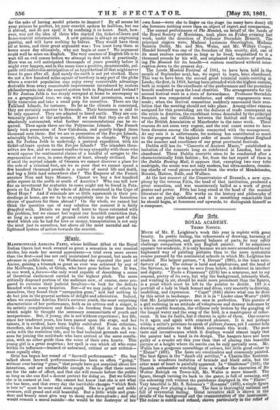31111dr.
MADEINOISELII ADELINA Parr', whose brilliant debut at the Royal Italian Opera last week created so great a sensation in our musical circles; has made her second appearance—a trial even more severe than the first—and has not only maintained her ground, but made an advance in public favour. On only she repeated the part of Amine, gaining a triumph as great as ever was achieved by any of the Malibrans, Linde, or Grism, who have gone before her. It was, in one word, afarore—the only word capable of describing a scene of theatrical excitement carried to the highest pitch. The more critically disposed portion of the audience now, of course, came pre- pared to exercise their judicial faculties—to look for the defects blended with so many beauties. But—if we may judge of othets by ourselves, they found. their "occupation gone," and had nothing to do but join in the general acclaim of delight and admiration. Indeed, when we consider Adelina Patti's extreme youth, the most surprising characteristic of her performance, both as an actress and a singer, is its artistic completeness and finish—its freedom from those faults which might be thought the necessary concomitants of youth and inexperience. But, if young, she is not without experience; her life, since her tenderest years, has been passed upon the stage, and her talents, it is evident, have been highly cultivated. From Criticism, therefore, she has plainly nothing to fear. All that it can do is to swim with the resistless tide, and to find technical grounds and rea- sons for joining the multitude who have arrived at the same conclu- sion, with no other guide than the voice of their own hearts. This young girl is a great magician; her spell is one which all who come within its influence—learned or unlearned, critical or not critical— must equally obey.
Grim has began her round of "farewell performances." She has talked about farewell performances—has been so often "going," without ever having " gone," that people have got sceptical about her intentions, and are uncharitable enough to allege that these moves are for the sake of effect, and that she will remain before the public as long as she can find a decent pretext for doing so. But we believe she is in earnest at last. She cannot but know that she is not what she has been, and that every day the inevitable changes "which flesh is heir to" must be more and more rapid. She is a great and noble creature, still grand and still beautiful. But a little while and gran- deur and beauty must give way to decay and decrepitude; and she would commit a moral suicide—she would be the destroyer of her own fame—were she to linger on the stage (as many have done) till she becomes nothing more than an object of regret and compassion.. The annual performance of The Messiah, on behalf of the_ funds of the Royal Society of Musicians, took place on FridaLeveMng fait week; undet the direction of Professor Stem:1de Bennett, The principal singers were; Madame Lemmens Sherrington, Madame Sainton Dolby, Mr. and Mrs. Weiss, and Mr. Wilbye Cooper.
Handel Matadi* Was one of the founders of this society Mid, one of its most Zealous members as to as he lived,' bequeathed to it a thousand pounds by his will, and originated the cnstam of perfonii- ing The Messiah for its benefit—a custom continued without inter- ruption down to the preaent, day. The Leeds .Musical Festival ° f 1861, to hive been held in the month of September next, has, we regret to learn, been abandoned. This was to have been the second great triennial music-meeting at Leeds; the first, in 1858, haVing been attended. With the highest success, both in respect to the excellence of the performance and the pectiniary benefit eoidetred upon the local chatitiee. The arrangements for the second festival were in a State of forwardness. Professor Steindale Bennett was reappointed &indictor, and other engagements were made; when.the festival, committee suddenly announced their reso- lution that the meeting should not take place. Among other reasons assigned foi this. proceeding are the dulnesi of trade consequent on the crisis in Anierica, the exorbitant terms demanded by the principal Vocalists, and the collision between the festival and the meeting of the Biitlib. Aesociation at Manchester in the same Week. These reasons do not seem very cogent, and the real cause seems to have been disunion among the °facials connected_ with the management. At any rate it is unfortunate, for nothing has contributed so much to the progress of the highest order of music thiongliont England as the number and excellence of our great provincial festivals. Dublin still has its "Concerts of Ancient Music," established in imitation of the concerts long so Celebrated in London, but noW abandoned. These Dublin concerts seem to be conducted after a characteristically Irish fashion ; for, from the last repeit of them in the Dub& Evening. Mail, it appears that, excepting two very trite madrigals, the music was not only modern, but ultra-modern, consist- ing clueflyof vocal pieces selected froni the works of Mendelssohn, Rossini, Hatton, Balfe, mid. Wallace, At the last concert of the Conservatoire of Brussels, a new spiv; ghony by the veteran Fedi, the head of that institution, produced a reat sensation, and was unanimously hailed as a work of great _genius and power. Fetis has long stood at the head of the musical literature of the day. His works on the history and philosophy of his art are justly celebrated, and it is something remarkable that he should begin, at fourscore and upwards; to diStinguish himself as a composer.






























 Previous page
Previous page